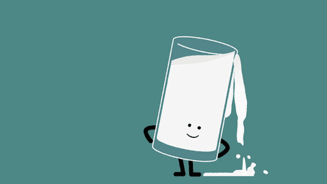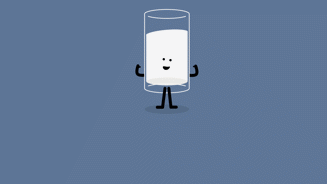
Yes, of course you can drink too much milk. As for any other food there is a limit to how much of it you should consume on a regular basis. But how much is too much milk?
National dietary guidelines are made by nutritional experts to help you stay healthy, get the nutrients you need, avoid lifestyle diseases and becoming overweight. In many countries, dairy is recommended as a part of a healthy, balanced diet. While the milk recommendations in some countries are at least one serving of milk daily, the milk recommendations in other countries are up to three servings per day. And you should predominantly eat low-fat dairy products on a daily basis.

The guidelines vary a little from country to country, so you should seek out your own country's dietary guidelines for specific advice. If you want to check out what different countries’ recommend, the UN’s Food and Agricultural Organisation FAO has compiled a list of various nations’ dietary recommendations.
The conclusion must be, that dairy can be part of a healthy, balanced diet as long as you enjoy it in relevant amounts. Too much dairy will take up space for other types of food that contain important nutrients that milk doesn’t provide, for example fibre, iron, vitamin C and many more. A balanced diet should also include vegetables, fruit, legumes, nuts, seeds, egg, fish, lean meat and poultry. A healthy lifestyle also includes a sufficient amount of water, exercise and sleep.
Read more about the benefits of milk
Is dairy necessary?
Of course you can live without milk and dairy. But if you chose to remove a whole food category like dairy from your diet, be aware of the specific nutrients that you will miss out on. For example calcium that helps you maintain normal bones and protein that helps you maintain normal muscle function, but also vitamin B2, vitamin B12, potassium, phosphorus and iodine. You should seek other ways to include them on a daily basis.

Milk is a nutrient-dense drink that contains a natural composition of nutrients. Drinking milk or eating dairy is a very easy way to obtain these nutrients on a daily basis without a lot of preparation and cooking.
Is whole milk good for you?
No single food is healthy or unhealthy on its own. This goes for both carrots and ice cream. It’s your whole diet in combination that determines if you eat healthily or not. Whole milk is not bad for you, if you make sure to balance your diet so that it can fit in.
Most national dietary guidelines emphasizes that you should choose lower fat dairy on a regular basis. So stick to lower-fat dairy products and only enjoy full fat products in smaller amounts.
If you really enjoy whole milk, make sure to adjust your fat intake from other sources and use it in smaller amounts, for example a glass of whole milk just once in a while. It can also be a good replacement for cream in cooking or in your coffee.
If you are in doubt about what your individual nutritional needs are, you can discuss your diet with your doctor or a nutritionist.
Can plant based milk alternatives replace milk?
No, non dairy drinks don't offer the same nutrients as cow's milk. Plant based drinks and milk are fundamentally not the same type of foods. Yet plant based drinks are often compared to milk, because many of them are used in occasions where people would traditionally use milk. But the nutritional benefits of plant based drinks are not the same as the ones of cow’s milk, which has a natural composition of protein, vitamins and minerals.
Plant-based drinks do not naturally provide the same vitamins and minerals that milk contains. Only soy drinks come close to milk’s natural level of protein. Therefore, many non-dairy milk alternatives are fortified to better match the nutrition in milk.
Health authorities recommend to eat a varied diet, so if you choose to exclude a whole food group like dairy from your diet, you will take some nutrients out that are important to certain body functions, for example protein and calcium that help maintain muscles and bones. Make sure to get these nutrients through other food sources.
Read more about plant-based milk alternatives
When can babies drink milk?
The only food or drink infants need in the first 6 months of their life is breastmilk. Your baby may show interest in more solid food a little earlier, and then it’s okay to start experimenting with taste and texture. But even when you start introducing more solid foods from the age of 6 months you should continue breastfeeding.
It is important for you to eat a healthy, balanced diet during your pregnancy and as you breastfeed. Combining breastfeeding and bottle feeding may reduce your breast milk supply and it may be difficult to reverse the decision not to breastfeed. If you want to know more about breastfeeding, baby food and nutrition, you should contact your healthcare provider, especially if you're considering opting out of breast-feeding.

Can a baby drink too much milk?
In the first 6 months of their life, breastmilk is the only food or drink infants need. When your baby is ready to consume complementary food, you should carefully include foods appropriate for your child’s age group and foods which contain the adequate amounts of nutrients to help your baby grow and develop. This includes a variety of food sources.
So yes, there is a risk that if your baby past the age of six months drinks too much milk or eats too much dairy, they will not have the necessary appetite for other types of food with important nutrients. For example, milk doesn’t provide fibre, iron, vitamin C and many more nutrients.
The recommendations for when you should start including dairy and other food products in your baby's diet and how much milk they should consume on a daily basis vary from country to country. So does the nutrients in the different milk types and dairy products available to you locally.
As this Arla website is legally based in Denmark, the guidance we can give you needs to comply to Danish guidelines. Danish food authorities recommend that cow's milk and other dairy products can be included as an ingredient in meals and in small portions, but preferably not before the age of 9 months. In other countries, however, the recommendation might be a little different. So please seek the specific advise from your national dietary guidelines or health authorities on when, how much and which specific products to include in your baby's diet.

Do toddlers and older kids need milk?
As well as a lot of other nutrients, toddlers and older kids need calcium, protein, vitamin B2, vitamin B12, iodine, phosphorous and potassium. These are all nutrients that milk can easily provide on a daily basis. Milk is not the only way to get for example calcium and protein, but it’s one of the simplest ways of ensuring that your child gets some of these nutrients that they need on a daily basis as recommended by national dietary guidelines.
Nutrients from milk are very easy to obtain and milk, yogurt or cheese are easy to include in the meals that your child eats during the day. Even if your child doesn't have a great appetite.
If your child doesn’t drink milk or other dairy products, you have to be careful to replace these with other food sources that provide the same amount of important nutrients. Be aware that plant-based milk is not really milk and does not provide the same composition of nutrients as cow’s milk.
The benefits of calcium
Calcium is one of these important nutrients that the body needs from childhood to old age. Calcium helps your child grow and develop their bones, that mainly consists of calcium. As they become a teenager and later an adult, calcium can help maintain normal growth and development of their bones and teeth throughout life.

Just one glass of milk (200 ml, 1.5% fat) provides you with 30% of the required daily intake of calcium.
If your child doesn’t drink milk or eat yogurt or cheese, they can get calcium from green leafy vegetables such as kale, broccoli and cabbage, soy beans, nuts and fish such as sardines where they eat the bones.
Protein is another nutrient that your child can get from milk. Protein is necessary to grow and develop children’s bones. As the child becomes and adult, protein helps maintain bones all the way through to old age. If your child doesn’t drink milk or eat yogurt or cheese, they can also get protein from beans, pulses, fish, eggs and meat.
Exactly how much protein, calcium, fat, vitamins and other minerals your child needs depends on age, gender and your national recommendations.
Read more about nutrients in milk and their benefits
Does dairy cause mucus?
You may have heard someone claim that milk and dairy products cause mucus. However, scientific studies do not back up that drinking milk results in increased mucus production.
If you suffer from asthma or have a cold, your saliva and mucus may sometimes feel thicker and it feels as if it’s harder to swallow milk. If that happens, you might be reluctant to include milk in your diet. But there are no public health authorities that recommend excluding milk from your diet to avoid mucus formation.
Does milk cause acne and are dairy products bad for your skin?
Is dairy bad for my skin? Is there a link between dairy and acne? Would it be good for my skin if I give up dairy and go on a dairy-free diet? These are questions that more teenagers and adults have asked on Google in their attempt to get rid of whiteheads, blackheads and pimples.
Acne is mostly caused by changes in our hormone levels and not the food we eat. Whether dairy products are increasing a skin condition or making the symptoms worse cannot be clearly confirmed by science at this time. So it is up to you to decide if you feel your symptoms are worsened or not by drinking milk and eating dairy products.
Does milk provide any benefits for my skin?
There is no clinical studies to confirm or deny this, but it is a fact that different dairy products provide a range of nutrients, such as zinc, iodine and vitamins A, and B2. These nutrients are needed for the maintenance of normal skin. For example, milk and yogurt contain vitamins B2 and iodine, and Cheddar is a source of vitamin A and zinc.